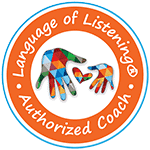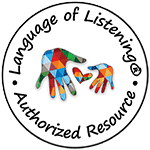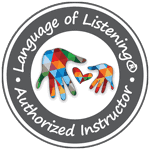Inside: Whether you’re dealing with a 3 year-old talking back, a 4 year-old talking back or a 12 year-old talking back, these two powerful techniques are simple and can completely change the dynamics with your child.
About a year ago, I was going through my perpetual scroll of Facebook when I came across something that stopped me in my tracks.
A video of a young boy screaming back at his mother. He was enraged. Sobbing. Out of control. He started screaming obscenities, and as his mother recorded the whole thing, and later shared it with the world, my heart sunk to my stomach.
I wanted to tell her something. Well…first I wanted to hug her, and then I wanted to tell her something. Because if she knew about how to handle back talk and disrespect, it could change everything for both her and her son.

When you see a 4 year-old talking back.
There are times when kids feel “trapped in a cage,” and there is seemingly no path out. In their deep desire to feel heard, kids who feel trapped will act out using the only power tools they know – the ones they learn from adults: They scream, yell, argue, boss or punish.
Acting out is the child’s way of communicating. A child who is doing those things is actually trying to get you to understand that he is right to feel the way he does and wishes you could see past his actions to the person he is underneath.
If you only hear, see and react to the disrespectful behavior (symptoms of an underlying problem) instead of the message – “I want you to understand who I really am!” – the child will have no choice but to escalate his message or disconnect from you completely.
I get the parents side too.
As a parent you do so much for your kids. Things they don’t even know about or understand. The laundry you’re folding at midnight. The job you’re working to earn money for the roof over their heads. The nights you can’t sleep because you’re worried about your kids’ breathing. And all you want is a little something in return: Respect.
Whether you have a 4 year-old talking back or a 12 year-old talking back, it’s only natural to feel powerless. You want to help your child, but it seems like nothing works. You don’t know what to do!
And…when you feel powerless, you’re going to want to yell, scream, punish or videotape your child and post it on the internet so you can feel powerful.
It makes so much sense! Of course, you would do anything to feel powerful when you don’t know how to help your child!
Without realizing it, you and your child feel much of the same feeling—powerlessness.
What if you knew an easier way out?
When you have a child talking back, they are desperately asking you for help. Remember that it always starts with us — the parents. Kids cannot even think at the maturity level needed to break a behavior cycle, let alone do anything about it. So, as the parents, it has to start with us.
Related: 13 Brilliantly Simple Habits That Raise Well-Adjusted Kids

If you’re able to get to the bottom of kids’ communications, they will feel very understood and accepted. This allows kids to move out of the “trapped in a cage” feeling, away from the back talk and disrespect, and into a place of cooperation. When kids trust and feel safe, they will start to grow and surprise you in the most amazing ways.
How to stop a child talking back.
It always starts with validation.
This is the step of connection, and the easiest way to validate a child is to use a technique called SAY WHAT YOU SEE®, where you step out of your head and into the moment with your child.
If you are able to sit or squat down next to your child for a moment and objectively observe the situation (what is your child thinking, feeling, doing or saying), you will take a huge first step toward building trust and connection with your child. This only takes a short amount of time.
Validating kids is not a reward, it’s connecting so your child can feel heard and understood. Once a kids’ upsets are heard, they will move out of the “trapped in a cage” feeling and open up to your guidance.
Related: Why Is My Child So Angry and Aggressive? A Solution-Based Approach
But…what if validation doesn’t stop talking back?
There’s a simple technique you can use to meet your child’s need for power quickly. This works extremely well whether you have a 2, 4 or 12 year-old talking back. If a child shouts at you or looks increasingly upset, take a very deliberate step back. If possible, you can squat down to below eye-level and say, “Looks like I’m too close and you don’t like that! Tell me where to move.”
The child may point and say, “Move there in the corner.”
You’ll move and your child may say, “No, not there. There.”
When a kids correct you, they are starting to meet their need for power, and you’ll know this technique is starting to work.
That simple step puts kids in the lead, helps kids feel a sense of control and begins to meet their need for power in a way that is OK with me (rather than screaming and shouting). When you allow a child to feel a small sense of control, talking back will immediately begin to de-escalate.

Your child will open up to your guidance.
When kids’ needs are met they have an amazing ability to stay calm and cooperate with you. That’s just how kids work. Once you’re on your child’s side, offer guidance. It might sound something like this…
“Let’s start over. When you’re upset about something, you can say, ‘I don’t like that’ or ‘I’m not okay with that’ and then we can talk about it and problem solve together.”
That’s the starting point.
More than anything, your child needs you.
Imagine how awesome it would feel to know that when your child has a conflict with someone in their adult life that they can handle it calmly and problem-solve?
That’s what parenting is all about! To raise our kids so they can become successful, happy, healthy and thriving adults.
A year ago, I did reach out to the mom who shared a video of her son for the world to see. I wanted to hug her and let her know that I understood. I understood why she did it, but also that I knew her and her son were more alike than she realized.
While I never heard back from her, the video was eventually removed. I can only hope that she was able to see herself and her son for who they really were–two people doing the best they could with the tools they had.
And I can only hope that with more tools—like the ones shared in this post—they can enjoy calmer days and more peaceful interactions. All parents and kids deserve that.
Print this free listening checklist.
This post comes with a free printable checklist to help with listening. I always have the hardest time remembering these phrases. This printable simplifies it!
Here is a sneak preview…
Download Your Free Printable
- Download the checklist. You’ll get the printable, plus join 37,000+ parents who receive my weekly parenting tips and ideas!
- Print. Any paper will do the trick, but card stock
would be ideal.
- Place it on your refrigerator. Check things off as you go and don’t forget a thing!
Want more on parenting?
- Two Words That Will Tame Temper Tantrums – Every Time
- How to End Screen-Time Without a Struggle
- How to Help Your Child Follow a Routine Without Reminders
- The Most Powerful Way to Stop a Whining Child – Immediately
- 10 Empowering Ways to Improve Toddler Listening
I've created a free email series just for you! If you are struggling with teaching your child to listen, this series will help transform your parenting. Yes, really. I've seen my proven strategies work time and time again for parents. I know it can work for you too.
After taking my free email series, you will:
- Learn simple, yet highly effective listening strategies
- Experience a stronger connection with your child
- Enjoy more peaceful parenting days
- Gain more cooperation from your child














I’m so glad I got this in my inbox today! It’s just what I needed to hear, my 5 year old is talking back and I had NO idea what to do except to say “we don’t talk to mom like that!” and that has not been working, so THANK YOU!
I’m so glad this was helpful for you, Jess!
OMG- I so needed this, my almost 4 year old is doing a lot of talking back lately, and I always seem to say the wrong thing! So thank you for this!!
I’m so glad this spoke to you, Jenny! Thanks for reading!
So when my 4 yo is begging for candy in the checkout line and I say not today or no, the argument begins with her and I am supposed to do all of this in the cashier line with her 4 yo brother? Yeah, ok. That’s why I just can’t take advice like this seriously. It’s so disconnected from everyday reality that I can’t see how it fits into the situations where this behavior rears it’s ugly head.
I don’t see how these suggestions can’t be applied in public settings, as you’re suggesting. Acknowledge their feelings, it can be as simple as, “wow, you have a lot of strong feelings about (xyz).” Then tell them, this isn’t up for discussion. They will most likely continue to cry because they didn’t get what they want, but that’s OK. They are just venting their frustration. Kids don’t bottle up their emotions like adults do.
If your kid goes into total freak out mode, they’re probably telling you they need something more. It’s not about the chocolate bar, or whatever, they probably are having a hard time right now (maybe something happened at school? With a friend? At home?) and all they need is a big hug from mom/dad.
I am raising my grandson. He has been with me since birth and just turned three. This journey is harder than I ever imagined, more difficult than raising my own children.
He has been talking back lately. If I say, “you need to be quieter please”, he snaps back with, “you be quiet”. Of course this angers me. This happens often, how do I handle it reasonably?
He also has an issue with listening to instructions. He avoids eye contact when I get down on his level. All these problems are making life unhappy for us both. Help!!
Kim
I’m at my wit’s end with my 4-year-old. He’s 3rd born of 4 children and lately has been engaging in power struggles both at home and with his teachers, including hitting and kicking them. If I say to him “you need to stop screaming” he’ll say, “no, you do” (even if I wasn’t screaming at all or he’ll scream louder, “don’t talk to me!” Tonight at bedtime he essentially told me I’m only good enough to be the family dog, and then his tantrum escalated when I wouldn’t rub his back.
I think your article has some sound advice, but I feel like my son’s behavior is so bad that he needs to learn he’s *not* in control and doesn’t deserve to be in control as long as he’s being disrespectful to myself and his teachers. My oldest 2 went through power struggle phases but never tried my patience the way this boy does! How do I get him to understand that when he is violent toward me or says hurtful things it makes me not want to have anything to do with him? It’s such a horrible way to feel as a parent!
Rebecca, I hear you!! I have the exact same issue at home and at school, and it’s SOO frustrating! if you have found a solution on how to deal with this, PLEASE let me know. It’s so hard as parents when we’re being pushed to our limits and we really do not know how to curb these outbursts and anger from our 5 year old.
Yea, okay, so we tried this. We let our 5 year old tell us things to do (where to move, how to draw the picture exactly how she is drawing hers, or sit the way she wants us to sit) to try to avoid some of the back talk. Not surprisingly, it just adds a completely new element to her back-talking and problematic episodes. Now we have to deal with multiple rage issues stemming from her expectation she can make us do things exactly as she wants.
Oh, and she still back talks.
My son (4 1/2) and I just had counseling today and I mentioned that he mocks me. The counselor said it wasn’t mocking but offered no more (it was our first session so it was more about observation today and not advice). When I returned home, I googled what is means and came across this article. I have read it before as I subscribe to your email posts but it made more sense to me today. Thank you.